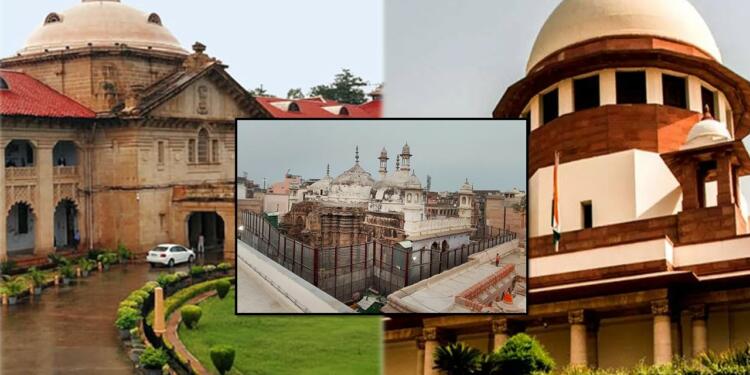Gyanvapi Survey: In a significant development, the truth surrounding the Gyanvapi Complex in Varanasi is set to be revealed, as the Allahabad High Court boldly dismissed a petition filed by Islamists seeking to impede the Archaeological Survey of India (ASI) survey. The court’s brave decision came amidst recent concerns over the Supreme Court’s stance on staying the survey of Gyanvapi structure, despite assurances from the authorities.
On 3rd August, the Allahabad High Court rejected the plea submitted by the Anjuman Intezamia Masjid Committee, challenging the Varanasi district court’s order from 21st July that permitted the ASI to conduct a comprehensive survey of the disputed Gyanvapi structure. Following a hearing on 27th July, the court reserved its final decision, ultimately upholding the Varanasi Court’s order.
GYANVAPI | #AllahabadHighCourt DISMISSES Anjuman Intezamia Masjid Committee's challenge to the #Varanasi District Judge's July 21 order for the ASI Survey of the #GyanvapiMosque.#GyanvapiMasjid #GyanvapiASISurvey pic.twitter.com/xj6FDk2hob
— Live Law (@LiveLawIndia) August 3, 2023
Chief Justice Pritinker Diwaker’s bench asserted that the scientific survey was a crucial step in the pursuit of justice and fair resolution. The court highlighted the significance of issuing a commission for the survey, emphasizing the Varanasi Court’s well-justified decision in ordering the ASI to conduct the examination. The pursuit of truth through a scientific survey has been deemed essential by the judiciary.
The survey of the Gyanvapi Complex commenced on 24th July, as directed by the Varanasi district court. However, the Muslim side swiftly moved to the Supreme Court to seek a stay on the survey. To accommodate the ongoing proceedings, the apex court temporarily suspended the survey until 5 PM on 26th July. However, the recent ruling by the Allahabad High Court now paves the way for the survey to proceed unhindered.
Also read: Carbon dating: The truth of Gyanvapi shall be out soon, courtesy Allahabad HC
It is noteworthy that the Allahabad High Court enjoys immense respect and credibility in the Indian judiciary. Several eminent jurists, including DY Chandrachud, have been associated with the institution and later served as Chief Justice of India. The court’s decision to stand firm on the scientific survey aligns with the principles of natural justice, emphasizing the pursuit of truth over any other considerations.
The Gyanvapi Complex has been a source of prolonged dispute, with various religious groups laying claim to its historical and religious significance. The ASI survey aims to provide an unbiased and comprehensive examination of the site’s archaeological evidence, shedding light on the layers of history and cultural heritage it encompasses.
While the survey moves forward, it is crucial for all parties involved to respect the court’s decision and cooperate with the ASI’s investigation. The pursuit of truth and justice should be above any religious or political inclinations, and the findings of the survey should be accepted with an open mind and a commitment to communal harmony.
In conclusion, the Allahabad High Court’s dismissal of the petition to obstruct the ASI survey at the Gyanvapi Complex is a commendable step towards seeking the truth and upholding the principles of justice. The court’s bold stance, even in the face of an interim stay from the Supreme Court, demonstrates its commitment to natural justice. As the survey progresses, it is hoped that the process will be transparent and unbiased, bringing clarity to the historical and religious significance of the site.
Support TFI:
Support us to strengthen the ‘Right’ ideology of cultural nationalism by purchasing the best quality garments from TFI-STORE.COM

























